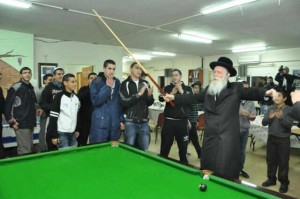Through the mitzvah of taking an oath—to give charity or to do something good—and fulfilling it right away, you are privileged to experience oneg Shabbat. Oneg Shabbat means engaging in the bodily pleasures on Shabbat for the sake of Heaven, and not in order to satisfy your physical cravings, God forbid.
Immediately fulfilling your oath also graduates you to a more spiritual level of eating, even on weekdays. This enhanced level of eating is also a type of oneg Shabbat. Rebbe Nachman teaches that oneg Shabbat alludes to eating in a dignified and sanctified way (Likutey Moharan I, #57). If you can eat on this level, you don’t need to fast. {Rebbe Nachman doesn’t mean you don’t have to fast on Yom Kippur or the other obligatory fast days. He means you don’t have to undertake a voluntary fast day in order to achieve your spiritual goals.} When your eating is consistently on this high level, you gain mastery over your temper. You can achieve a high level of calmness that nothing angers you or even annoys you. Besides the obvious benefit of not becoming incensed when things don’t go your way, there is a tremendous by-product.
Our Sages tell us (Pesachim 66b) that when a person becomes angry, he is stripped of some of his Torah-wisdom. The reverse is also true. When are you careful to control your temper, your lost Torah-wisdom is given back to you. As your Torah-wisdom is restored, your Divine image shines more brightly. This beaming sacred light weakens your spiritual opponents and eventually gets rid of them. They are no longer be able to harm you or anything else in Creation. This is alluded to in the Torah when it says, “All the beasts of the field will fear and dread you” (Genesis 9:2).
*
The food you eat on Shabbat is very precious and very holy. Why? Because that food is transformed into pure, unadulterated holiness and Godliness. The Sitra Achra (the Side of Evil, aka “the bad guys”) has no portion whatsoever in the food you eat on Shabbat. This doesn’t happen automatically. You have to eat in the dignified and sanctified manner, as we mentioned above, and you have to eat genuinely for the sake of Heaven.
As your Shabbat-eating becomes more like this—the more it is authentic oneg Shabbat—the less often you will get angry and the less your anger will be. Not only that, but people and influences that prevent you from being a better Jew will fade out of your life. Perhaps best of all, you’ll merit to love your fellow Jews and live peacefully with all of them.
© Copyright 2014 148west.com/O. Bergman

